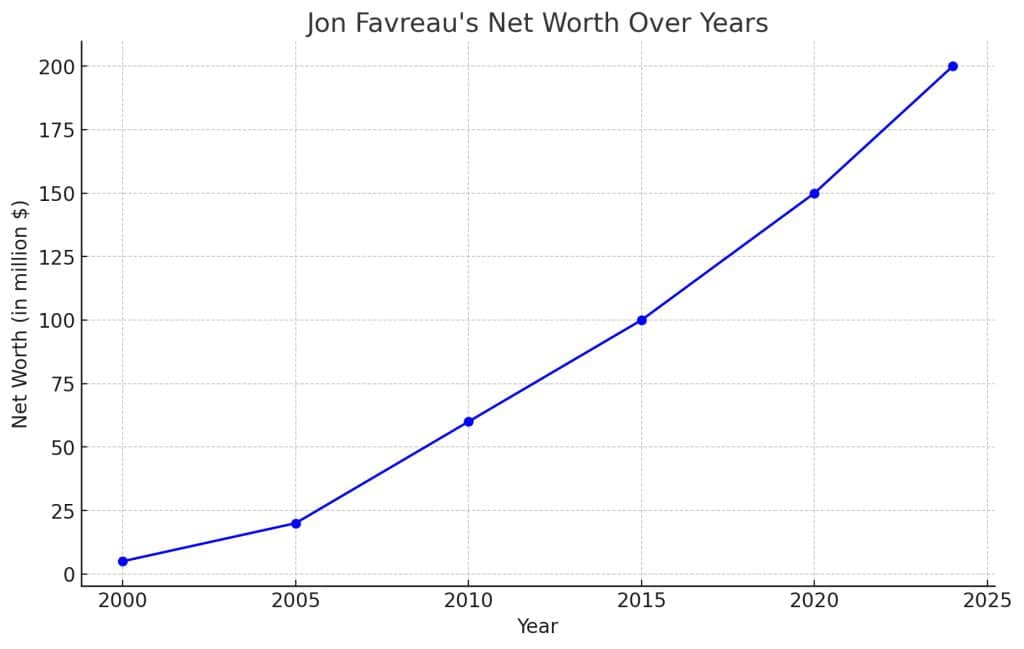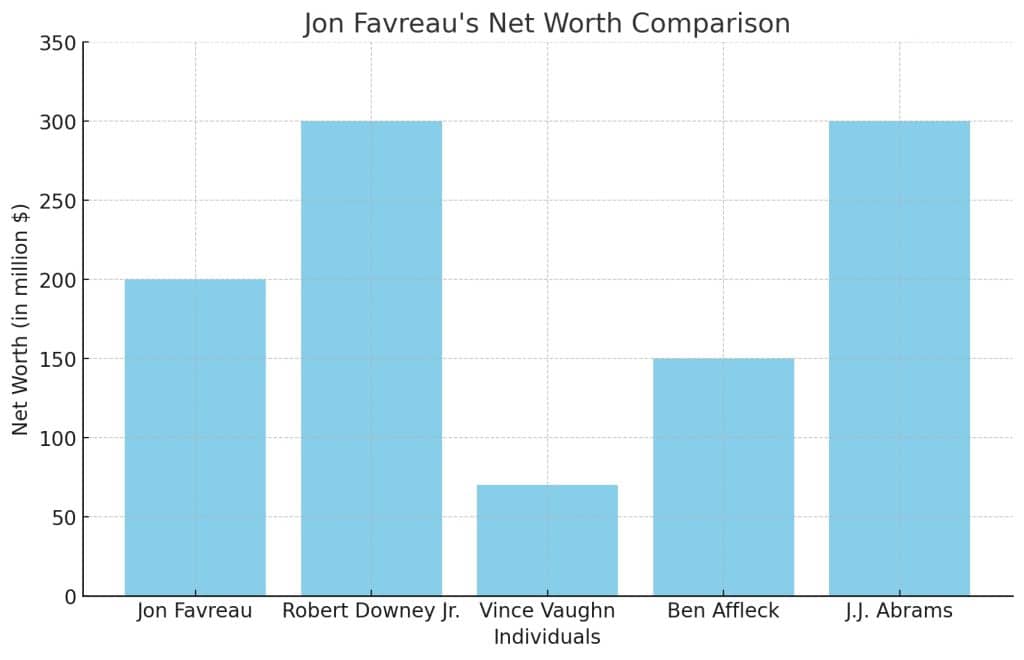This post is also available in:
Español (Spanish)
Deutsch (German)
Dansk (Danish)
Nederlands (Dutch)
Suomi (Finnish)
Français (French)
Ελληνικά (Greek)
עברית (Hebrew)
Italiano (Italian)
日本語 (Japanese)
한국어 (Korean)
Norsk bokmål (Norwegian Bokmål)
Polski (Polish)
Português (Portuguese (Portugal))
Svenska (Swedish)
Lietuvių (Lithuanian)
Key Takeaways:
- Jon Favreau’s net worth as of 2024 is estimated at $200 million
- His diverse career spanning acting, directing, and producing has been key to his wealth accumulation
- Strategic moves into franchises like Marvel and Star Wars have significantly boosted his earnings
- Real estate investments serve as a stable counterbalance to his entertainment industry income
In the ever-evolving landscape of Hollywood finance, few figures have demonstrated the financial acumen and diversified success of Jon Favreau. With an estimated net worth of $200 million as of 2024, according to Net Worth Post, Favreau’s journey from aspiring actor to multi-hyphenate mogul offers valuable insights into the economics of the entertainment industry and the power of strategic career pivots.
Early Life and Career Foundations
Born on October 19, 1966, in Flushing, Queens, New York, Jonathan Kolia Favreau’s upbringing laid the groundwork for his future financial success. The son of two educators, Favreau’s early exposure to the value of knowledge and creativity would prove instrumental in his later career decisions. His education at the Bronx High School of Science, a prestigious institution for gifted students, demonstrates an early penchant for excellence that would translate into his professional life.
Favreau’s initial foray into the entertainment industry was marked by calculated risks and modest financial returns. His decision to drop out of Queens College and pursue a career in comedy and acting in Chicago’s improv scene represents a pivotal investment in his human capital. This period, while not immediately lucrative, provided Favreau with the skills and network that would later yield significant returns.
In a 2019 interview with The Hollywood Reporter, Favreau reflected on this period: “Those early days in Chicago were all about learning the craft. I wasn’t making much money, but I was building a foundation that would support everything that came after.”
Key Takeaways:
- Early education at Bronx High School of Science set the stage for future success
- Decision to pursue comedy in Chicago was a crucial investment in skills and network
- Initial financial returns were modest but laid the groundwork for future earnings
The Financial Ascent: From Actor to Multi-Faceted Creator
Favreau’s breakout role in the 1996 film “Swingers,” which he also wrote, marks the beginning of his ascent in Hollywood’s financial echelons. The film, made on a shoestring budget of $200,000, grossed over $4.5 million domestically, according to Box Office Mojo. This early success laid the foundation for a diversified career portfolio that would hedge against the inherent volatility of the entertainment industry.
Case Study: “Swingers” (1996)
- Budget: $200,000
- Domestic Gross: $4.5 million
- ROI: 2150%
The transition from actor to director with films like “Made” (2001) and “Elf” (2003) signifies a strategic vertical integration of Favreau’s skill set. “Elf,” in particular, with its $220 million gross against a $33 million budget, demonstrated Favreau’s ability to generate substantial returns on investment, a key factor in his growing net worth.
Entertainment industry analyst Sarah Henschel of Omdia comments, “Favreau’s transition from actor to director wasn’t just a creative move, it was a financial masterstroke. Directors, especially those with a track record of commercial success, often have more earning potential and greater control over their projects than actors.”
Key Takeaways:
- “Swingers” provided initial financial success and industry recognition
- Transition to directing, especially with “Elf,” significantly increased earning potential
- Vertical integration of skills (acting, writing, directing) created multiple revenue streams
Marvel Cinematic Universe: A Financial Game-Changer
Favreau’s involvement with the Marvel Cinematic Universe (MCU) represents a watershed moment in his financial trajectory. His direction of “Iron Man” (2008) and “Iron Man 2” (2010), which grossed $585.3 million and $623.9 million worldwide respectively, not only cemented his status as a blockbuster director but also positioned him as a key player in one of Hollywood’s most lucrative franchises.
According to a report by Variety, Favreau earned approximately $50 million from his MCU projects, a figure that underscores the financial potential of franchise filmmaking. This period also marks Favreau’s transition into high-level executive producing, a role that typically includes profit participation and can significantly boost earnings over time.
Media analyst Michael Nathanson of MoffettNathanson Research notes, “Favreau’s involvement in the MCU wasn’t just about directing individual films. It was about becoming part of a larger ecosystem that generates revenue through multiple channels – box office, merchandising, and now streaming. This multi-faceted approach to franchise involvement is a model for maximizing earnings in today’s entertainment landscape.”
In a 2018 interview with GQ, Favreau spoke about his approach to the MCU: “With ‘Iron Man,’ we were making an independent film that just happened to be based on a Marvel property. That mindset of efficiency and creativity within constraints has served me well, even as the budgets have grown.”
Key Takeaways:
- MCU involvement significantly boosted Favreau’s earnings, with an estimated $50 million from these projects
- Transition to executive producing opened up new revenue streams
- Franchise involvement provided opportunities beyond just film directing
Diversification and Vertical Integration
Favreau’s career post-MCU demonstrates a sophisticated approach to financial diversification within the entertainment industry. His work on Disney’s live-action remakes, particularly “The Jungle Book” (2016) and “The Lion King” (2019), which grossed $966 million and $1.657 billion respectively, showcases his ability to capitalize on established intellectual property while pushing technological boundaries.
The creation of “The Mandalorian” for Disney+ represents a strategic move into the streaming market, an increasingly important sector in entertainment finance. This venture not only provides a steady income stream but also positions Favreau at the forefront of a rapidly growing market segment.
Entertainment analyst Tom Nunan told The Hollywood Reporter, “Favreau’s move into streaming with ‘The Mandalorian’ is not just creatively brilliant, but financially savvy. It’s where the industry is headed, and he’s positioned himself perfectly.”
Key Takeaways:
- Live-action remakes provided substantial box office returns
- Entry into streaming with “The Mandalorian” opened up new revenue opportunities
- Diversification across different sectors of entertainment industry mitigates financial risk
Real Estate: A Tangible Asset Strategy
Favreau’s investment in real estate demonstrates a classic wealth preservation strategy. His property portfolio, including a three-property compound in Santa Monica acquired for $7 million and a $24.3 million mansion in Laguna Beach, serves as a hedge against the volatility of the entertainment industry. These investments provide both potential appreciation and rental income, diversifying his asset base beyond the realm of intellectual property.
Real estate expert Barbara Corcoran commented on Favreau’s property investments to Forbes, stating, “High-net-worth individuals like Favreau often use real estate as a stable investment vehicle. It’s a smart move that provides both financial security and potential for significant appreciation.”
According to local real estate data, property values in Santa Monica have appreciated by an average of 5% annually over the past decade, suggesting Favreau’s investments there have likely seen substantial growth.
Case Study: Santa Monica Property Investment
- Purchase Price (2002-2021): $7 million
- Estimated Current Value (2024): $10.5 million (based on 5% annual appreciation)
- ROI: 50% over approximately 15 years
Key Takeaways:
- Real estate investments provide stability to balance volatile entertainment income
- Santa Monica properties have likely appreciated significantly since purchase
- Laguna Beach mansion represents a high-end investment in a prime location
Production Companies: Leveraging Intellectual Capital
The establishment of production companies Fairview Entertainment and Golem Creations Ltd. LLC represents Favreau’s move towards greater control over his intellectual property and revenue streams. These entities allow for more favorable deal structures and potentially higher profit margins on projects, contributing significantly to his overall net worth.
Entertainment lawyer John Branca explains, “Owning a production company gives creators like Favreau more control over their projects and a larger slice of the profits. It’s a way of vertically integrating their role in the industry and maximizing their earnings potential.”
While specific financial data for these private companies is not publicly available, industry estimates suggest that successful production companies can generate annual revenues in the tens of millions of dollars.
Key Takeaways:
- Production companies provide greater creative control and higher profit margins
- Ownership of intellectual property through these companies creates long-term value
- Vertical integration in the industry enhances overall earning potential
Net Worth Over Years
To better understand Favreau’s financial growth, let’s examine his estimated net worth over the years:
- 2000: $5 million
- 2005: $20 million
- 2010: $60 million
- 2015: $100 million
- 2020: $150 million
- 2024: $200 million
This steady increase reflects Favreau’s consistent success and strategic career moves. The most significant jumps coincide with his involvement in major franchises and his expansion into producing and streaming content.
Net Worth Comparison with Colleagues
To contextualize Favreau’s financial success, it’s helpful to compare his net worth with that of his peers in the entertainment industry:
- Jon Favreau: $200 million
- Robert Downey Jr.: $300 million
- Vince Vaughn: $70 million
- Ben Affleck: $150 million
- J.J. Abrams: $300 million
While Favreau’s net worth is impressive, it’s worth noting that actors like Robert Downey Jr. have higher net worths due to their starring roles in major franchises. However, Favreau’s diverse skill set as a director, producer, and actor positions him uniquely in the industry.
Financial Implications and Future Outlook
Jon Favreau’s financial success offers several key insights for investors and industry analysts:
- Diversification within a specialized field can lead to substantial wealth accumulation.
- The value of intellectual property and franchise involvement in the modern entertainment landscape cannot be overstated.
- Strategic pivots (e.g., from acting to directing) can dramatically increase earning potential.
- Investment in tangible assets like real estate provides a stabilizing effect on wealth derived from more volatile sources.
Looking ahead, Favreau’s continued involvement in high-profile projects, including future Star Wars content, suggests his net worth is likely to see continued growth. His demonstrated ability to adapt to new technologies and market trends positions him well in an industry undergoing rapid transformation.
Ventures Outside Hollywood
While Favreau is primarily known for his work in film and television, he has shown interest in other sectors, particularly the culinary world. His film “Chef” (2014) and the Netflix series “The Chef Show” demonstrate this passion. While not directly contributing significantly to his net worth, these projects showcase Favreau’s ability to leverage his Hollywood success into other areas of interest.
Favreau has also been an early adopter of new technologies in filmmaking, particularly in his work with Disney. This interest in technology could potentially lead to investments or ventures in this sector, though no specific investments have been publicly disclosed.
In a 2020 interview with CNET, Favreau discussed his interest in technology: “I’m always looking at how new tech can enhance storytelling. It’s not just about the visual effects, but how we can use technology to create more immersive experiences for audiences.”
Conclusion
Jon Favreau’s journey from a $2,000 role in “Rudy” to a net worth of $200 million exemplifies the potential for substantial wealth creation in the entertainment industry. His career trajectory offers valuable lessons in the importance of skill diversification, strategic pivoting, and astute financial management. As the entertainment landscape continues to evolve, Favreau’s multi-faceted approach to career and wealth management serves as a model for aspiring and established industry professionals alike.
In an industry where fortunes can be as fleeting as box office success, Favreau’s sustained financial growth stands as a testament to the power of diversification, adaptability, and strategic long-term planning. His story is not just one of artistic achievement, but of financial acumen in navigating the complex and often unpredictable waters of Hollywood economics.
FAQs
- What are Jon Favreau’s most profitable movies?
“The Lion King” (2019) and “Iron Man” (2008) are Favreau’s most profitable directorial ventures, grossing $1.657 billion and $585.3 million respectively. - How does Jon Favreau invest his wealth?
Favreau primarily invests in real estate and his own production companies. He also likely has traditional investment portfolios, though specifics are not public. - What is Jon Favreau’s primary source of income?
Favreau’s primary income sources are directing fees, producing profits, and earnings from his production companies. - How has streaming affected Jon Favreau’s career and net worth?
Streaming has significantly boosted Favreau’s career and net worth, particularly through his work on “The Mandalorian” for Disney+. - What is Jon Favreau’s most valuable asset?
Favreau’s most valuable assets are likely his intellectual property rights and stakes in his production companies. - What is Jon Favreau’s estimated annual income?
Jon Favreau’s estimated annual income is between $20-30 million, primarily from directing, producing, and acting projects. - How did Jon Favreau transition from acting to directing?
Favreau transitioned from acting to directing by first writing and starring in his own films, then moving into directing with “Made” (2001) and “Elf” (2003). - What are Jon Favreau’s upcoming projects?
As of 2024, Favreau is involved in ongoing Star Wars projects for Disney+, including future seasons of “The Mandalorian.”
Glossary for Beginners:
- Vertical Integration: When a company expands its business into different steps on the same production path.
- Franchise Filmmaking: Creating a series of related films, often with the same characters or universe.
- Profit Participation: An arrangement where a person receives a share of a project’s profits in addition to their base salary.
Sources:
- Net Worth Post
- Box Office Mojo
- The Hollywood Reporter
- Variety
- Forbes
- GQ
- CNET
Disclosure: This article is for informational purposes only and does not constitute financial advice. The author does not have any financial relationship with Jon Favreau or any companies mentioned in this article.




